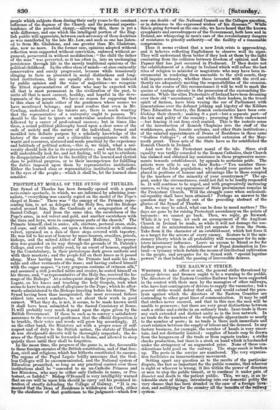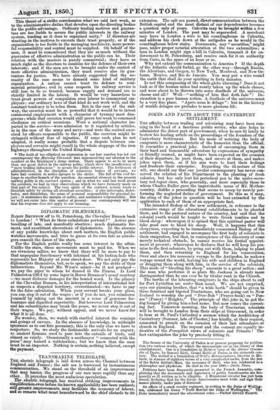12 A TLWAY STRIKE.
WICETHER it take effect or not, the general strike threatened by railway drivers and firemen ought to be a warning to the public. The directors of the Eastern Counties Railway have been supported in the contest with their men by the managers of other railways, who have lent contingents of drivers to supply the vacancies ; but a general strike would defeat that aid, and would extend the pant- lysisagaiirt which the directors of the Eastern Counties are contend' to other great lines of communication. It may be said that strikes never succeed, and that in this case the men will be unable to persevere ; but there are very great distinctions between such a strike and a strike in an ordinary trade. Inno trade is there any such extended and distinct unity as in the iron network. In no trade do the numbers of the workpeople Opproximate so nearly to the number of posts ; in no trade is there such immediate and overt relation between the supply of labour and the demand. In any factory business, for example, the nuinber of hands is very uncer- tain, and not distinctly limited ; supplies of hands may be drawn from the hangers-on of the trade or from cognate trades ; a. strike checks production, but there is a stock on hand which is husbanded under the stringency of an augmented price. None of these con- siderations hold good on the railway. The stage-coach is broken up. The posts in the service are numbered. The very organiza- tion facilitates an insurrectionary movement. Setting apart any question as to the merits of the particular dispute, the fact so important for the public remains, that whoever is right or whoever is wrong, it lies within the power of directors or men to stop the public transit, or to continue it under pain of disaster and death to the patient public. This, we say, is an in- tolerable state of things, introducing into our domestic polity the very chance that has been dreaded in the ease of a foreign inva- sion, and nullifying for the country all the benefits of the railway
system. • ' " • This threat of a stripe corroborates -what we said last week, as to the administrative duties that devolve upon the directing bodies for the public advantage. Ordinary trading motives and guaran- tees are too feeble to secure the public interests in the railway system, tending as it does to organized unity.* If directors are wanting in the motives to execute their trust properly, or if the organization is too feeble in the managing machinery, more power- ful responsibility and control must be supplied. On behalf of the men, it must be remembered that they are as much without the guarantee of effective administration as the public can be. Their relation with the masters is purely commercial ; they have as much right as the directors to combine for the defence of their own interests ; and if the men are to be brought under the control of more effective administration, they must receive also its gua- rantees for justice. We have already suggested that the ne- cessity of the case seems to demand some kind of military organization. A nation cannot trust its defence to com- mercial principles ; and in some respects its railway service is still less to be so trusted, because supply and demand are so strictly limited in the labour. It would be very hazardous to trust great powers of compulsion over labour to commercial em- ployers : our ordinary laws of that kind do not work well, and the oonstantlendency is to relax them. But in the case of the rail- way, the coercion must be so powerful that it would be to invest commercial employment with a character of tyranny most dan- gerous ; while that coercion would still prove too weak to command obedience on critical occasions. Were a national character im- parted to the service—were admission to it regulated by articles, as in the case of the army and navy—and were the control exer- cised by officers responsible to the public, the coercion might be stringent without fear of injustice. If some such plan be not adopted, it really seems probable that a dispute between em- ployers and servants might result in the whole stoppage of the iron highways throughout the United Kingdom.
• The fault of too elliptical an expression in our last number has led our contemporary the Morning Chronicle into misconceiving our allusion to the accident at the Bricklayer's Arms station. There appear to us to be more than one great defect in the railway polity, which show the insufficiency of "mere trading influences" to secure the public interest. The feebleness of administration, in the discipline of numerous bodies of servants, we have had occasion to notice apropos to the strike. The fall of the roof be- longs to another branch of the question. An essential element in the present railway polity is the contract system ; and in what we said last week about the awadent, we had in view oervations which we have formerly made on that part of the subject. The very spirit of the contract system tends to diminish safety by saving all abundant securities ; it also interrupts, distri- butes, and diminishes, the sense of personal responsibility for personal in- jury: it minimizes the margin of safety, and minimizes responsibility. But we will not enter into this matter at present : our contemporary will see that his response does not apply to our meaning



























 Previous page
Previous page